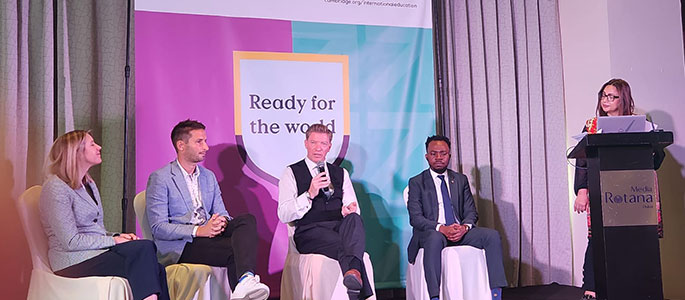05 Feb 2025

On the 16 January 2025, the Cambridge UAE team tackled the uncertainties surrounding AI innovations in education during an eventful day featuring a distinguished lineup of speakers targeted to principals and school leaders in the UAE. With representatives from 23 schools in the UAE in attendance, the day began with a session on enhancing digital education, led by Lindsay Nadin, Director of Digital Products and Services at Cambridge. She discussed the opportunities AI presents, such as reducing teacher workload and providing data-driven insights to support students. Nadin emphasised Cambridge's people-centric and learning-focused approach to AI, aimed at empowering teachers and elevating learning opportunities.
Another session was delivered by Bryan Maddox and Fawaz Abu Sitta, research directors from the Digital Education Futures Initiative (DEFI) at the University of Cambridge. They explored the dialogue on AI and education, balancing present dilemmas with future anticipation. The session concluded that futuristic and anticipatory approach has consistently helped humans adapt to disruptive changes throughout the history of humans.
The event also featured a panel discussion moderated by Tabinda Mazhar, Head of Education. The panel featured Kelvin Hornsby, Principal/CEO of GEMS World Academy, Abu Dhabi, Sr. Vice President of GEM Education, Davin Harkin, CEO and Founder of 8BillionIdeas, Dare Pitan, Digital Education Lead at The University of Birmingham Dubai, and Lindsay Nadin. Additionally, Sarah Saiger, UAE Country Manager, invited EdTech industry experts Eugene Pributkov, Founder and CEO of Voicee, and Bazz Najjar, Vice President of Education Technology and Digital Innovation, to conduct hands-on breakout sessions to the school delegates.
AI in the classroom is definitely the major talking point for schools at the moment. A few days after the event in the UAE on the 24 January was International Education Day, the theme of which for 2025 was 'AI and education: Preserving human agency in a world of automation.' In a LinkedIn post on the day, Ben Schmidt, Global Director, International Education at Cambridge, echoed Lindsay Nadin’s sentiments about AI empowering teachers, rather than replacing them, stating that 'AI tutors and other emerging tools have great potential to deliver an educational impact, but only by building on established approaches to teaching and learning, not by supplanting them.'
Read the full article: Robots not role models: Why AI won't replace great teachers

